|
Fun Toys That Teach
Technology
Of
all the gifts I got when I was younger the one I enjoyed most often,
and for the longest number of years, was an electronics project kit
that consisted of a board full of basic components and a booklet
with many different projects that could be built using them. The
components were the basic type; resistors, capacitors, transistors,
transformer, potentiometer, etc. The projects in the booklet taught
the fundamental ways in which each component on the board operated.
The different projects were each fun to build and operate, but the
best part was that after learning how everything on the board worked
you had the freedom to experiment with designs of your own
imagination - finding out what would work and what wouldn't.
Consumer electronics are everywhere now, but most of them have inner
workings that are sealed off to the user, or too small and
integrated to be tinkered with even if you can get them open. This
can be very discouraging to a young, and potentially inventive mind.
In this article I've picked out some kits that I think are excellent
for learning all about electrical and electronic technology from the
ground up.
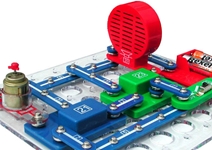 The 'Brain Box 188' is a great beginner kit designed for kids 7 & up. It
has enough components and hookup combinations to build and test 188
different circuits. The circuits are connected using simple snap
together bars, and it comes with an interactive CD that provides
animated instructions. The 'Brain Box 188' is a great beginner kit designed for kids 7 & up. It
has enough components and hookup combinations to build and test 188
different circuits. The circuits are connected using simple snap
together bars, and it comes with an interactive CD that provides
animated instructions.
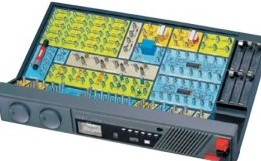 The 'Elenco MX-907 200-in-1 Electronic Project
Lab' is a slightly more sophisticated version of this same concept.
Probably appropriate for 10 years and older, it offers more
components and more possible design combinations. Instead of snap-on
bars, the components are connected using pre-cut wire lengths that
are held to the components using spring clips. This is the type of
kit that I enjoyed so much when I was younger, especially because it
has the flexibility to be interconnected with external devices and
allows you to get creative. The 'Elenco MX-907 200-in-1 Electronic Project
Lab' is a slightly more sophisticated version of this same concept.
Probably appropriate for 10 years and older, it offers more
components and more possible design combinations. Instead of snap-on
bars, the components are connected using pre-cut wire lengths that
are held to the components using spring clips. This is the type of
kit that I enjoyed so much when I was younger, especially because it
has the flexibility to be interconnected with external devices and
allows you to get creative.
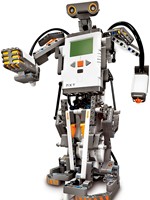 The 'LEGO MindStorms NXT' robotics kit ads mechanics and robotics to
an electronics education. It comes with a humanoid type physical
frame, servo motors to make it move and walk, electronic sensors to
"see" its environment and help it navigate, and a programmable
control module to act as its "brain". The controller includes a
fairly sophisticated microprocessor, flash memory to store
programming and data code, and USB and wireless connectivity for
interfacing with a personal computer. There is also some interesting
3rd party software available to assist in writing programs for the
controller, such as from
National Instruments. The 'LEGO MindStorms NXT' robotics kit ads mechanics and robotics to
an electronics education. It comes with a humanoid type physical
frame, servo motors to make it move and walk, electronic sensors to
"see" its environment and help it navigate, and a programmable
control module to act as its "brain". The controller includes a
fairly sophisticated microprocessor, flash memory to store
programming and data code, and USB and wireless connectivity for
interfacing with a personal computer. There is also some interesting
3rd party software available to assist in writing programs for the
controller, such as from
National Instruments.
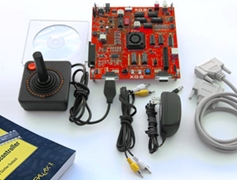 For someone interested in learning the fundamentals of programming a
computer, and the satisfaction and excitement of
creating their own video game and playing it, XGameStation makes
several different game console kits. These kits are actual computer
gaming consoles that can be programmed to play any video game of the
user's creation, allowing for the hardware capabilities. The kits
come with all the necessary components and hardware, PC interface
cabling, programming software, and a detailed instruction and
programming manual written by computer scientist Andre LaMothe.
There are also some example games included that can be played right
away. For someone interested in learning the fundamentals of programming a
computer, and the satisfaction and excitement of
creating their own video game and playing it, XGameStation makes
several different game console kits. These kits are actual computer
gaming consoles that can be programmed to play any video game of the
user's creation, allowing for the hardware capabilities. The kits
come with all the necessary components and hardware, PC interface
cabling, programming software, and a detailed instruction and
programming manual written by computer scientist Andre LaMothe.
There are also some example games included that can be played right
away.
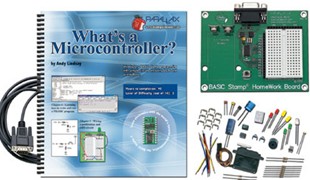 Industrial and home automation is everywhere now. There are
literally hundreds of kits and ways to get started learning about
these fields, but one of the best and affordable is the 'BASIC Stamp
Microcontroller kit'.
There are several different variations of the kit, with varying
prices, but they all include a programmable microcontroller chip,
circuit board with some interfacing circuitry (for connecting to
external devices such servo motors and sensors), a communication
cable for connecting to a PC
for programming, and an instructional manual.
The manual details the microcontroller design, how it operates, how
to program it, and some example uses. This is a great way to learn
about electronic and automation technology from the ground up. Industrial and home automation is everywhere now. There are
literally hundreds of kits and ways to get started learning about
these fields, but one of the best and affordable is the 'BASIC Stamp
Microcontroller kit'.
There are several different variations of the kit, with varying
prices, but they all include a programmable microcontroller chip,
circuit board with some interfacing circuitry (for connecting to
external devices such servo motors and sensors), a communication
cable for connecting to a PC
for programming, and an instructional manual.
The manual details the microcontroller design, how it operates, how
to program it, and some example uses. This is a great way to learn
about electronic and automation technology from the ground up.
I've just touched on a few of my favorites for advancing ages and
levels of sophistication, but they're all a great way to get started
in the fun and exciting fields of electronics, robotics, computers,
and automation. The most important thing is that they all start the
user with a fundamental education on the basic building blocks of
the various technologies and then advance on that solid foundation.
In my opinion that gives the user a definite advantage over many
others that they may compete against if they pursue a technology
career in the future.
P.H.
Where these kits can be purchased:
RoboToys.com
RobotStore.com
XGameStation.com
Amazon.com
|


 del.icio.us
del.icio.us
 Slashdot It!
Slashdot It!
 Stumble It!
Stumble It!
 The 'Brain Box 188' is a great beginner kit designed for kids 7 & up. It
has enough components and hookup combinations to build and test 188
different circuits. The circuits are connected using simple snap
together bars, and it comes with an interactive CD that provides
animated instructions.
The 'Brain Box 188' is a great beginner kit designed for kids 7 & up. It
has enough components and hookup combinations to build and test 188
different circuits. The circuits are connected using simple snap
together bars, and it comes with an interactive CD that provides
animated instructions.
 The 'Elenco MX-907 200-in-1 Electronic Project
Lab' is a slightly more sophisticated version of this same concept.
Probably appropriate for 10 years and older, it offers more
components and more possible design combinations. Instead of snap-on
bars, the components are connected using pre-cut wire lengths that
are held to the components using spring clips. This is the type of
kit that I enjoyed so much when I was younger, especially because it
has the flexibility to be interconnected with external devices and
allows you to get creative.
The 'Elenco MX-907 200-in-1 Electronic Project
Lab' is a slightly more sophisticated version of this same concept.
Probably appropriate for 10 years and older, it offers more
components and more possible design combinations. Instead of snap-on
bars, the components are connected using pre-cut wire lengths that
are held to the components using spring clips. This is the type of
kit that I enjoyed so much when I was younger, especially because it
has the flexibility to be interconnected with external devices and
allows you to get creative.
 The 'LEGO MindStorms NXT' robotics kit ads mechanics and robotics to
an electronics education. It comes with a humanoid type physical
frame, servo motors to make it move and walk, electronic sensors to
"see" its environment and help it navigate, and a programmable
control module to act as its "brain". The controller includes a
fairly sophisticated microprocessor, flash memory to store
programming and data code, and USB and wireless connectivity for
interfacing with a personal computer. There is also some interesting
3rd party software available to assist in writing programs for the
controller, such as from
The 'LEGO MindStorms NXT' robotics kit ads mechanics and robotics to
an electronics education. It comes with a humanoid type physical
frame, servo motors to make it move and walk, electronic sensors to
"see" its environment and help it navigate, and a programmable
control module to act as its "brain". The controller includes a
fairly sophisticated microprocessor, flash memory to store
programming and data code, and USB and wireless connectivity for
interfacing with a personal computer. There is also some interesting
3rd party software available to assist in writing programs for the
controller, such as from
 For someone interested in learning the fundamentals of programming a
computer, and the satisfaction and excitement of
creating their own video game and playing it, XGameStation makes
several different game console kits. These kits are actual computer
gaming consoles that can be programmed to play any video game of the
user's creation, allowing for the hardware capabilities. The kits
come with all the necessary components and hardware, PC interface
cabling, programming software, and a detailed instruction and
programming manual written by computer scientist Andre LaMothe.
There are also some example games included that can be played right
away.
For someone interested in learning the fundamentals of programming a
computer, and the satisfaction and excitement of
creating their own video game and playing it, XGameStation makes
several different game console kits. These kits are actual computer
gaming consoles that can be programmed to play any video game of the
user's creation, allowing for the hardware capabilities. The kits
come with all the necessary components and hardware, PC interface
cabling, programming software, and a detailed instruction and
programming manual written by computer scientist Andre LaMothe.
There are also some example games included that can be played right
away. Industrial and home automation is everywhere now. There are
literally hundreds of kits and ways to get started learning about
these fields, but one of the best and affordable is the 'BASIC Stamp
Microcontroller kit'.
There are several different variations of the kit, with varying
prices, but they all include a programmable microcontroller chip,
circuit board with some interfacing circuitry (for connecting to
external devices such servo motors and sensors), a communication
cable for connecting to a PC
for programming, and an instructional manual.
The manual details the microcontroller design, how it operates, how
to program it, and some example uses. This is a great way to learn
about electronic and automation technology from the ground up.
Industrial and home automation is everywhere now. There are
literally hundreds of kits and ways to get started learning about
these fields, but one of the best and affordable is the 'BASIC Stamp
Microcontroller kit'.
There are several different variations of the kit, with varying
prices, but they all include a programmable microcontroller chip,
circuit board with some interfacing circuitry (for connecting to
external devices such servo motors and sensors), a communication
cable for connecting to a PC
for programming, and an instructional manual.
The manual details the microcontroller design, how it operates, how
to program it, and some example uses. This is a great way to learn
about electronic and automation technology from the ground up.